Quinquagesima, in the Western Christian Churches, is the last Sunday of Shrovetide, being the Sunday before Ash Wednesday. It is also called Quinquagesima Sunday, Quinquagesimae, Estomihi, Shrove Sunday, Pork Sunday, or the Sunday next before Lent.

Good Friday is a Christian holiday commemorating the crucifixion of Jesus and his death at Calvary. It is observed during Holy Week as part of the Paschal Triduum on the Friday preceding Easter Sunday, and may coincide with the Jewish observance of Passover. It is also known as Holy Friday, Great Friday, Great and Holy Friday, and Black Friday.
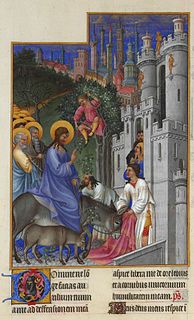
In some traditions of Christianity, Holy Week is the most sacred week in the Church year. In Eastern Rite Churches, also known as Eastern Orthodox, Holy Week occurs the week after Lazarus Saturday. In the rites of the Western/Latin/Roman Church it begins with Palm Sunday and concludes on Easter Sunday. For all Christian traditions it is a moveable observance that falls on the last week of Lent or Sixth Lent Week.

Holy Saturday, also known as Great and Holy Saturday, the Great Sabbath, Hallelujah Saturday, Saturday of the Gloria and Black Saturday or Easter Eve, and called "Joyous Saturday" or "the Saturday of Light" among Coptic Christians, is the final day of Holy Week, between Good Friday and Easter Sunday, when Christians prepare for the latter. The day commemorates the Harrowing of Hell while Jesus Christ's body lay in the tomb. Christians of the Catholic, Lutheran, Methodist, Anglican and Reformed denominations begin the celebration of the Easter Vigil service on Holy Saturday, which provides a transition to the season of Eastertide; in the Moravian Christian tradition, graves are decorated with flowers during the day of Holy Saturday and the celebration of the sunrise service starts before dawn on Easter Sunday.

The Paschal Triduum or Easter Triduum, Holy Triduum, or the Three Days, is the period of three days that begins with the liturgy on the evening of Maundy Thursday, reaches its high point in the Easter Vigil, and closes with evening prayer on Easter Sunday. It recalls the Passion, Crucifixion, Death, burial, and Resurrection of Jesus, as portrayed in the canonical Gospels.
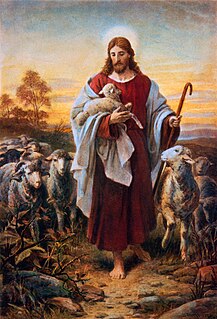
Good Shepherd Sunday occurs on the fourth Sunday in the Easter Season. The name derives from the gospel reading for the day, which is taken from the tenth chapter of John's Gospel. In this reading Christ is described as the "Good Shepherd" who lays down his life for his sheep. The Psalm for the day is Psalm 23, which also makes use of shepherd imagery.
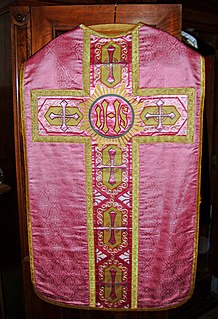
Laetare Sunday is the fourth Sunday in the season of Lent, in the Western Christian liturgical calendar. Traditionally, this Sunday has been a day of celebration, within the austere period of Lent. This Sunday gets its name from the first few words (incipit) of the traditional Latin entrance (Introit) for the Mass of the day. "Laetare Jerusalem" is Latin from Isaiah 66:10.

The Feast of the Ascension of Jesus Christ, also called Ascension Day, Ascension Thursday, or sometimes Holy Thursday, commemorates the Christian belief of the bodily Ascension of Jesus into heaven. It is one of the ecumenical feasts of Christian churches, ranking with the feasts of the Passion, of Easter, and Pentecost. Ascension Day is traditionally celebrated on a Thursday, the fortieth day of Easter, although some Christian denominations have moved the observance to the following Sunday. In the Catholic Church in the United States, the day of observance varies by ecclesiastical province.

Eastertide or Paschaltide is a festal season in the liturgical year of Christianity that focuses on celebrating the Resurrection of Jesus Christ. It begins on Easter Sunday, which initiates Easter Week in Western Christianity, and Bright Week in Eastern Christianity. There are several Eastertide customs across the Christian world, including sunrise services, exclaiming the Paschal greeting, clipping the church, and decorating Easter eggs, a symbol of the empty tomb. The Easter lily, a symbol of the resurrection, traditionally serve as the chancel flowers that decorate the chancel area of churches throughout Eastertide. Other Eastertide customs include egg hunting, eating special Easter foods and watching Easter parades.
The Introit is part of the opening of the liturgical celebration of the Eucharist for many Christian denominations. In its most complete version, it consists of an antiphon, psalm verse and Gloria Patri, which are spoken or sung at the beginning of the celebration. It is part of the Proper of the liturgy: that is, the part that changes over the liturgical year.

Easter Vigil, also called the Paschal Vigil or the Great Vigil of Easter, is a liturgy held in traditional Christian churches as the first official celebration of the Resurrection of Jesus. Historically, it is during this liturgy that people are baptized and that adult catechumens are received into full communion with the Church. It is held in the hours of darkness between sunset on Holy Saturday and sunrise on Easter Day – most commonly in the evening of Holy Saturday or midnight – and is the first celebration of Easter, days traditionally being considered to begin at sunset.

Asperges is a name given to the rite of sprinkling a congregation with holy water. The name comes from the first word in the 9th verse of Psalm 51 in the Latin translation which is sung during the traditional form of the rite except during Eastertide. The 51st Psalm is also one of the antiphons that may be sung in the rite under the Mass of Paul VI.
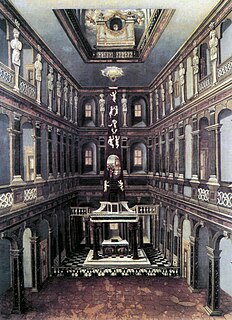
Weinen, Klagen, Sorgen, Zagen, BWV 12, is a church cantata by Johann Sebastian Bach. He composed it in Weimar for Jubilate, the third Sunday after Easter, and led the first performance on 22 April 1714 in the Schlosskirche, the court chapel of the Schloss in Weimar.
Throughout his life as a musician, Johann Sebastian Bach composed cantatas for both secular and sacred use. His church cantatas are cantatas which he composed for use in the Lutheran church, mainly intended for the occasions of the liturgical year.
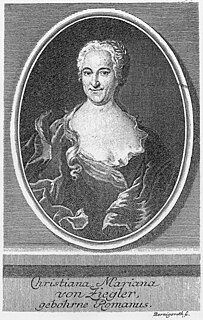
Ihr werdet weinen und heulen, BWV 103, is a cantata by Johann Sebastian Bach, a church cantata for the third Sunday after Easter, called Jubilate.
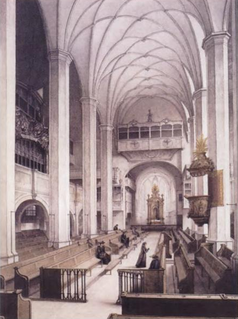
Wir müssen durch viel Trübsal, BWV 146, is a cantata by Johann Sebastian Bach, a church cantata for the third Sunday after Easter. Bach composed it in Leipzig in 1726 or 1728.

The cantatas composed by Johann Sebastian Bach, known as Bach cantatas, are a body of work consisting of over 200 surviving independent works, and at least several dozen that are considered lost. As far as known, Bach's earliest cantatas date from 1707, the year he moved to Mühlhausen, although he may have begun composing them at his previous post in Arnstadt. Most of Bach's church cantatas date from his first years as Thomaskantor and director of church music in Leipzig, a position which he took up in 1723.

Lent is a solemn religious moveable observance in the Christian liturgical calendar that begins on Ash Wednesday and ends approximately six weeks later, the night before Easter Sunday. The purpose of Lent is the preparation of the believer for Easter through prayer, mortifying the flesh, repentance of sins, almsgiving, simple living and self-denial. This season is observed in the Anglican, Eastern Orthodox, Lutheran, Methodist, Moravian, Oriental Orthodox, Reformed, United Protestant and Roman Catholic Churches. Some Anabaptist, Baptist and nondenominational Christian churches also observe Lent. Quartodeciman christians end the fast of Lent on the paschal full moon of the Hebrew calendar, in order to celebrate the Feast of Unleavened Bread beginning on the 14th of Nisan, whence the name derives. For this practice, they were excommunicated in the Easter controversy of the 2nd century.
Johann Sebastian Bach's chorale cantata cycle is the year-cycle of church cantatas he started composing in Leipzig from the first Sunday after Trinity in 1724. It followed the cantata cycle he had composed from his appointment as Thomaskantor after Trinity in 1723.
Johann Sebastian Bach worked at the ducal court in Weimar from 1708 to 1717. The composition of cantatas for the Schlosskirche on a regular monthly basis started with his promotion to Konzertmeister in March 1714.















